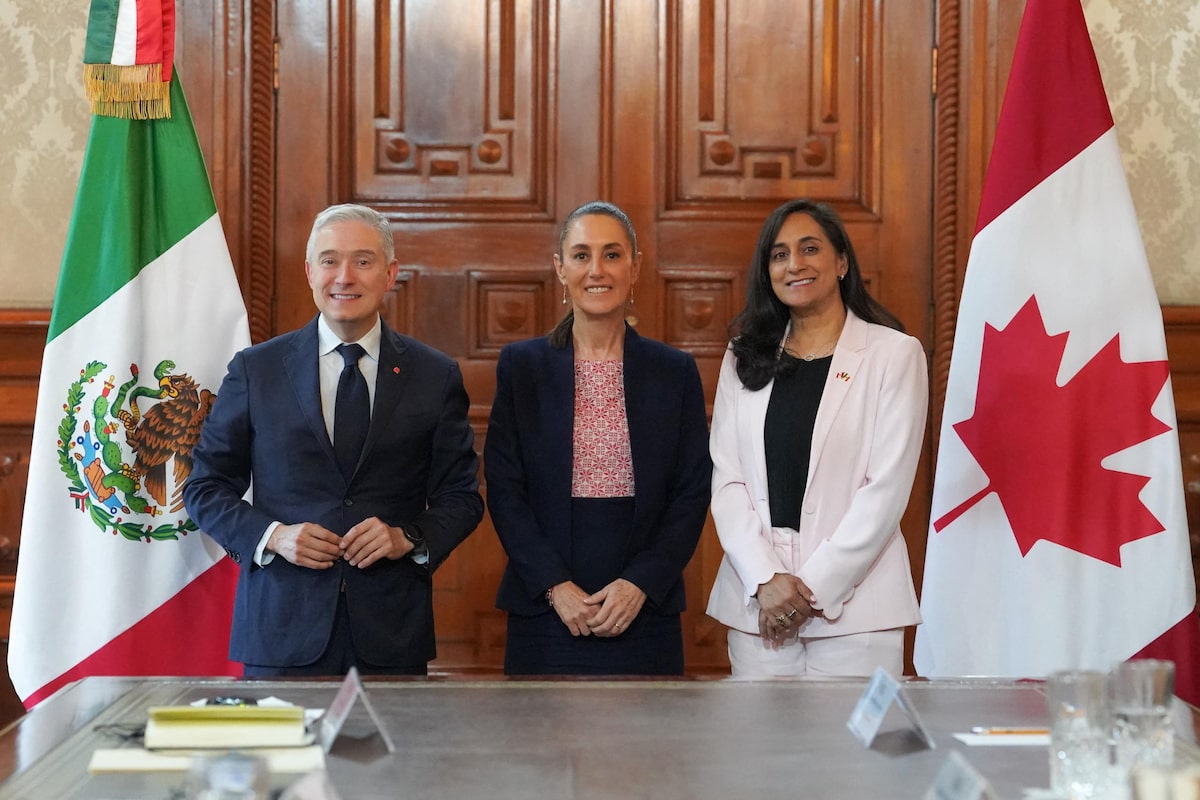Finance Minister François-Philippe Champagne, left, Mexico’s President Claudia Sheinbaum, centre, and Foreign Minister Anita Anand meet in Mexico City on Tuesday.Supplied/AFP/Getty Images
Senior Liberal cabinet ministers defended Canada’s strategy for trade talks with the United States after a day of meetings with Mexican officials who had secured a reprieve for their country on U.S. tariffs.
Finance Minister François-Philippe Champagne and Foreign Affairs Minister Anita Anand also met with Mexican President Claudia Sheinbaum for more than an hour Tuesday in a visit they said was meant to shore up bilateral ties.
They declined to tell reporters what they heard about why she was able to secure a 90-day extension before U.S. President Donald Trump hikes tariffs on her country, but Canada was not.
But both ministers said Canada’s relationship with the U.S. is different from Mexico’s, and each country is engaging in its own strategic interests.
“I think it has provided the right outcome for Canada, where we’ve been able to defend our industry, defend our workers and certainly put Canada on a path to rebuild our economy,” Mr. Champagne said.
Opinion: What does Donald Trump want from Canada? We are about to find out
Earlier this year, Mr. Trump imposed a 25-per-cent tariff on all goods from Canada and Mexico not covered by the United States-Mexico-Canada free-trade deal.
Both countries are also subject to tariffs on steel, aluminum and autos.
Canada has retaliated with its own tariffs, but Mexico has yet to impose retaliatory tariffs.
Mr. Trump threatened to hike that tariff rate to 30 per cent for Mexico and 35 per cent for Canada by Aug. 1 if new deals were not reached.
Mexico was granted a 90-day extension, but Canada was not.
In announcing the reprieve, Mr. Trump said he and Ms. Sheinbaum understood each other, but he criticized Canadian political leadership. While the extension for Mexico came after a phone call between Mr. Trump and Ms. Sheinbaum, Prime Minister Mark Carney and Mr. Trump have yet to speak.
Mr. Carney told reporters in Kelowna, B.C., on Tuesday they will when it “makes sense.”
He said the bigger picture to trade talks is next year’s review of USMCA, which ensures most of the goods traded between Canada and the U.S. remain tariff free.
Asked whether Canada is still considering any retaliatory tariffs, he said the policy is only to do what can have a maximum impact in the U.S. and a minimum impact in Canada.
“We don’t automatically adjust. We look at what we can do for our industry that’s most effective. In some cases, that will be to remove tariffs,” he told reporters after announcing supports for the softwood lumber industry.
“We have removed some tariffs over time, so that, for example, the auto industry can function more effectively and we’ll look at opportunities to do so because in the end we’re looking at having the best impact in Canada.”
Mexico grapples with Trump’s unrelenting demands
Mr. Champagne declined to say which tariffs Canada may consider removing.
The ministerial meetings in Mexico City underscore attempts to revive relations with Mexico.
Relations between the countries have slipped in recent years amid commercial disputes and misunderstandings, including suggestions from Canada early on in the trade dispute with the U.S. that Mexico be cut out of free-trade talks.
Ms. Anand said work to rebuild ties with Mexico began when Mr. Carney invited Ms. Sheinbaum to the G7 meeting in Kananaskis, Alta., earlier this year, and the trip to Mexico City is intended to build on that momentum.
She said the two countries have agreed to build a work plan to co-operate further on supply chain issues, energy security and other elements of trade.
Ms. Anand said Mexico’s relationship with the United States is different from Canada’s, making it difficult to compare the deals both are negotiating with the U.S.
“To parse out individual elements of one country’s negotiations versus our own is somewhat superficial, because the relationship is so very complex, and we really do need to understand that that complexity drives the entire negotiation,” Ms. Anand said.
The ministers have a second day of meetings planned for Mexico City.
Ms. Sheinbaum has described the pause her country obtained on tariffs as “not only an extension, rather of a very advantageous condition for Mexico compared to any other country.”
On Tuesday, she posted a photo on social media of herself meeting with Ms. Anand and Mr. Champagne, saying “We’re strengthening the relationship between our countries.”
Brenda Estefan, a former security attaché at the Mexican embassy in Washington and professor at the IPADE business school in Mexico City, said the two countries can’t collectively confront Mr. Trump.
But, she added, “both countries would tremendously benefit by having stronger ties. … If you already have a conflicting relationship with one of the three countries in the region, you want to have a smooth one with the other one.”
With a report from David Agren
